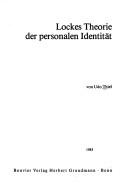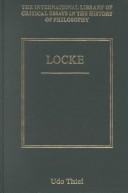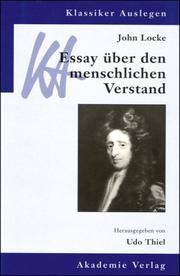| Listing 1 - 10 of 12 | << page >> |
Sort by
|
Book
ISBN: 9780199542499 019954249X Year: 2011 Publisher: Oxford Oxford university press
Abstract | Keywords | Export | Availability | Bookmark
 Loading...
Loading...Choose an application
- Reference Manager
- EndNote
- RefWorks (Direct export to RefWorks)
"Explores the understanding of self-consciousness and personal identity - two fundamendtal features of human subjectivity - as it developed in early modern philosophy. Udo Thiel presents a critical evaluation of these features as they were conceived in the sevententh and eighteenth centuries. He explains the arguments of thinkers such as Descartes, Locke, Leibniz, Wolff, and Hume, as well as their early critics, followers, and other philosophical contemporaries, and situates them within their historical contexts. Interest in the issues of self-consciousness and personal identity is in many ways characteristic [of] and even central to early modern thought, but Thiel argues here that this is also an interest that continues to this day, in a form still strongly influenced by the conceptual frameworks of early modern thought. In this book he attempts to broaden the scope of the treatment of these issues considerably, covering more than a hundred years of philosophical debate in France, Britain, and Germany while remaining attentive to the details of the arguments under scrutiny and discussing alternative interpretations in many cases"--Publisher's description, p. [4] of dust jacket.
History of philosophy --- Identity (Philosophical concept) --- Philosophy, European --- Self-consciousness (Awareness) --- Self-awareness --- Self-consciousness --- Consciousness --- European philosophy --- Identity --- Philosophy --- Comparison (Philosophy) --- Resemblance (Philosophy) --- History --- Identity (Philosophical concept) - History --- Self-consciousness (Awareness) - History --- Philosophy, European - 17th century --- Philosophy, European - 18th century

ISBN: 3416017560 9783416017565 Year: 1983 Volume: Bd. 183 Publisher: Bonn Bouvier
Abstract | Keywords | Export | Availability | Bookmark
 Loading...
Loading...Choose an application
- Reference Manager
- EndNote
- RefWorks (Direct export to RefWorks)
Identity (Psychology) --- History --- Locke, John, --- Psychology --- -Personal identity --- Personality --- Self --- Ego (Psychology) --- Individuality --- -Locke, John --- -ロック --- 로크 --- -History --- -Psychology --- Personal identity --- Locke, John --- Psychology. --- Philanthropus, --- Lokk, Dzhon, --- Lūk, Jūn, --- Lo-kʻo, --- Locke, Giovanni, --- Lock, --- Lock, John, --- Rokku, Jon, --- לוק, י׳ון, --- Locke, John, - 1632-1704

ISBN: 1840144149 Year: 2002 Publisher: Aldershot Ashgate
Abstract | Keywords | Export | Availability | Bookmark
 Loading...
Loading...Choose an application
- Reference Manager
- EndNote
- RefWorks (Direct export to RefWorks)
Knowledge, Theory of --- Metaphysics --- Philosophy --- God --- Ontology --- Philosophy of mind --- Epistemology --- Theory of knowledge --- Psychology --- Locke, John, --- Locke, John
Book
ISBN: 9780198704409 0198704402 Year: 2014 Publisher: Oxford : Oxford University Press,
Abstract | Keywords | Export | Availability | Bookmark
 Loading...
Loading...Choose an application
- Reference Manager
- EndNote
- RefWorks (Direct export to RefWorks)
Self-consciousness (Awareness) --- Identity (Philosophical concept) --- Philosophy, European --- Philosophy, European --- Conscience de soi --- Identité --- Philosophie européenne --- Philosophie européenne --- History. --- History. --- Histoire --- Histoire
Book
ISBN: 3499504502 Year: 1990 Publisher: Reinbek bei Hamburg Rowohlt
Abstract | Keywords | Export | Availability | Bookmark
 Loading...
Loading...Choose an application
- Reference Manager
- EndNote
- RefWorks (Direct export to RefWorks)
Book
ISSN: 03406059 ISBN: 3110557665 9783110557664 9783110560794 9783110559729 3110560798 3110559722 Year: 2017 Volume: 197 Publisher: Berlin De Gruyter
Abstract | Keywords | Export | Availability | Bookmark
 Loading...
Loading...Choose an application
- Reference Manager
- EndNote
- RefWorks (Direct export to RefWorks)
Es wurde in der Vergangenheit viel darüber debattiert, ob das Zentrum der Kritik der reinen Vernunft in der Erkenntnistheorie der „Transzendentalen Analytik“ oder in der Metaphysikkritik der „Transzendentalen Dialektik“ liegt. Stellt man den Begriff der Einheit des Bewusstseins in den Mittelpunkt der Auseinandersetzung, dann verliert diese Debatte an Bedeutung. Die „Einheit des Bewusstseins“ ist einerseits von zentraler Wichtigkeit für Kants Theorie der Objektivität, wie er sie in der „Deduktion der Kategorien“ entwickelt (denn die Kategorien selbst erhalten erst durch die Einheit des Bewusstseins ihre präzise Bestimmung). Sie gehört andererseits in die Seelenlehre und wird daher von Kant in den der Rationalen Psychologie gewidmeten Teilen der „Transzendentalen Dialektik“ thematisiert. Die vorliegenden Analysen von Henny Blomme, Bernd Dörflinger, Corey W. Dyck, Dietmar H. Heidemann, Thomas Höwing, Toni Kannisto, Heiner F. Klemme, Rudolf Mösenbacher, Giuseppe Motta, Dennis Schulting, Camilla Serck-Hanssen, Thomas Sturm, Udo Thiel, Violetta Waibel und Falk Wunderlich vertiefen das Verständnis dieses zentralen Begriffes der Kantischen Philosophie. The articles in this volume examine Kant’s notions of the “unity of consciousness”, “apperception” and “I Think” from a variety of perspectives. Several papers are concerned with textual analyses of the “Transcendental Deduction of the Categories” and the “Paralogisms of the Pure Reason”. Other contributions contextualize the notion of the unity of consciousness in relation to Kant’s work as a whole and to eighteenth-century philosophy.
Epistemology --- Metaphysics --- Consciousness --- Philosophy --- Kant, Immanuel, --- Philosophical anthropology --- Theory of knowledge --- Kant, Immanuel --- Cognitive psychology --- Consciousness - Philosophy --- Kant, Immanuel, - 1724-1804 --- Consciousness. --- Apperception --- Mind and body --- Perception --- Psychology --- Spirit --- Self --- Kant, I. --- Kānt, ʻAmmānūʼīl, --- Kant, Immanouel, --- Kant, Immanuil, --- Kʻantʻŭ, --- Kant, --- Kant, Emmanuel, --- Ḳanṭ, ʻImanuʼel, --- Kant, E., --- Kant, Emanuel, --- Cantơ, I., --- Kant, Emanuele, --- Kant, Im. --- קאנט --- קאנט, א. --- קאנט, עמנואל --- קאנט, עמנואל, --- קאנט, ע. --- קנט --- קנט, עמנואל --- קנט, עמנואל, --- كانت ، ايمانوئل --- كنت، إمانويل، --- カントイマニユエル, --- Kangde, --- 康德, --- Kanṭ, Īmānwīl, --- كانط، إيمانويل --- Kant, Manuel, --- Kant, Immanuel. --- epistemology. --- metaphysics.

Abstract | Keywords | Export | Availability | Bookmark
 Loading...
Loading...Choose an application
- Reference Manager
- EndNote
- RefWorks (Direct export to RefWorks)
Book
ISBN: 3110392577 3110367335 9783110392579 9783110367331 Year: 2014 Publisher: Berlin/Boston
Abstract | Keywords | Export | Availability | Bookmark
 Loading...
Loading...Choose an application
- Reference Manager
- EndNote
- RefWorks (Direct export to RefWorks)
Johann Nikolaus Tetens (1736-1807) gehörte zu den prägenden Gestalten der europäischen Aufklärung, und zwar sowohl innerhalb der Philosophie, im Kontext sprachtheoretischer und ästhetischer Diskurse, als auch in einer Reihe von Einzelwissenschaften (etwa der Mathematik und der Naturforschung). All diese Werkbereiche werden im vorliegenden Band von international renommierten Forschern eingehend betrachtet. Tetens hat als einer der ersten deutschsprachigen Autoren die Philosophie John Lockes und David Humes systematisch studiert und für die epistemologischen und moralphilosophischen Diskussionen der Zeit fruchtbar gemacht. Nicht zufällig wurde ihm in den britischen Debatten der Zeit der Titel eines ,deutschen Locke' verliehen. Er prägte wichtige Debatten, Kontroversen und Forschungsentwicklungen zwischen 1760 und 1790 insbesondere in seinem namhaften Einfluss auf Immanuel Kant. Tetens großer philosophischer Entwurf, Philosophische Versuche über die menschliche Natur und ihre Entwickelung von 1777, zeigt mit allem Nachdruck, dass es eine bedeutende und nachhaltige Rezeption und affirmative Aufnahme des britischen und französischen Empirismus in Deutschland gegeben hat. Dennoch suchte Tetens zugleich, die neuen Einflüsse dieses Empirismus mit den wolffianischen und leibnizianischen Lehren seiner Ausbildung zu vermitteln. Dieser spezifischen Vermittlungsleistung gilt ein besonderes Augenmerk aller Beiträge des Bandes.
Aufklärung. --- Enlightenment. --- Hume, David. --- Locke, John. --- Mathematics. --- Mathematik. --- PHILOSOPHY / History & Surveys / Modern. --- Tetens, Johann Nicolas, --- Tetens, J. N. --- Tetens, Ioanne Nicolao, --- Tetens, Johann Nikolaus, --- Tetens, Johannes Nikolaus,
Book
ISBN: 9783110372373 Year: 2014 Publisher: Berlin De Gruyter
Abstract | Keywords | Export | Availability | Bookmark
 Loading...
Loading...Choose an application
- Reference Manager
- EndNote
- RefWorks (Direct export to RefWorks)
Book
ISBN: 9783110737585 3110737582 Year: 2022 Publisher: Berlin De Gruyter
Abstract | Keywords | Export | Availability | Bookmark
 Loading...
Loading...Choose an application
- Reference Manager
- EndNote
- RefWorks (Direct export to RefWorks)
This volume examines (1) the philosophical sources of the Kantian concepts apperception and self-consciousness , (2) the historical development of the theories of apperception and deduction of categories within the pre-critical period, (3) the structure and content of A- as well as B-deduction of categories, and finally (4) the Kantian (and non-Kantian) meaning of apperception and self-consciousness .
Philosophical anthropology --- Kant, Immanuel --- Apperception --- Idealism, German --- Transcendental logic
| Listing 1 - 10 of 12 | << page >> |
Sort by
|

 Search
Search Feedback
Feedback About UniCat
About UniCat  Help
Help News
News